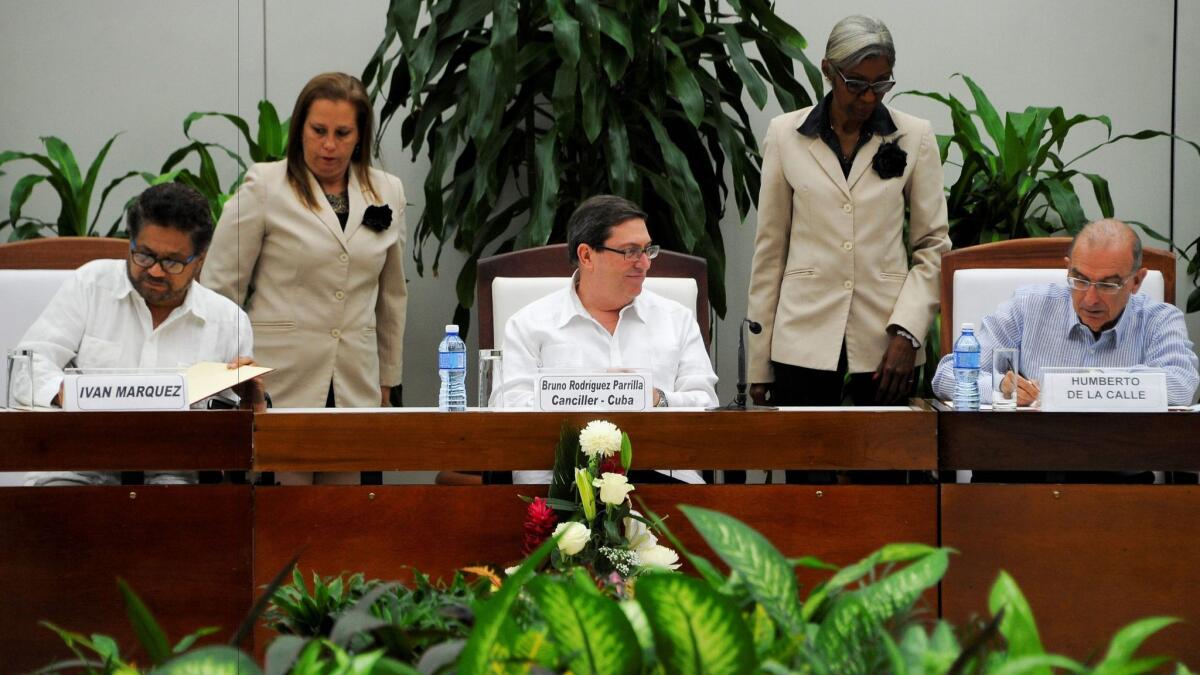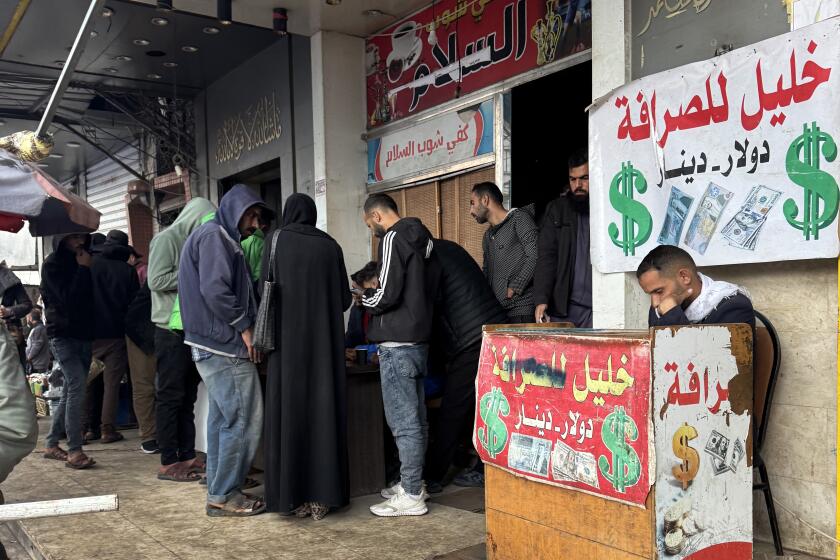Colombia’s government and FARC rebels sign modified peace agreement

The government of Colombia and the country’s largest rebel group announced a revised peace plan on Saturday, barely five weeks after voters rejected an earlier deal that would have ended more than a half century of bloody civil war.
Representatives of the government and the left wing Revolutionary Armed Forces of Colombia — known by its Spanish initials as the FARC — had been negotiating a revised peace deal since its narrow, and surprising, defeat of the deal in a national plebiscite on Oct. 2.
“We are convinced that … this document signals a viable and possible way to end so many decades of conflict,” the chief government negotiator, Humberto de la Calle, said in a statement as the new plan was unveiled.
The Colombian daily El Espectador, likening the event to the selection of a new pope, reported: “White smoke in Havana. There is a new peace accord.”
Exact details were still a bit vague. The two sides made the surprise announcement of the pact late Saturday in Havana, where negotiations had been ongoing.
“Today with humility I recognize that this accord is better,” said De la Calle, who alluded to critiques of the initial deal. That pact was announced by Colombian government and FARC representatives in September to worldwide acclaim.
The new plan, De la Calle said Saturday, “resolves many of those criticisms and insatisfactions,” but he added: “Its acceptance will not be unanimous.”
Public opinion polls leading up to the vote indicated the measure would pass, but it failed by the narrowest of margins — a defeat that stunned Colombia and many foreign observers, but reflected a belief among many Colombians that the deal was too lenient on the FARC, a peasant-based revolutionary group that emerged during the Cold War and has engaged in a 52-year-long insurgency against the government.
The plebiscite was nonbinding, and President Juan Manuel Santos had the authority to negotiate and sign a deal on his own. Still, Santos said before the election that he wanted the Colombian people to approve the plan to move forward and warned that he would not renegotiate the deal.
This time around, according to reports, Colombia’s Congress, not voters, will be asked to approve the accord. Analysts in Colombia immediately predicted that the revised plan would also have its share of critics, and that passage was far from guaranteed.
Voters’ rejection of the plan last month was a major blow for Santos, whose government finalized a peace deal with the FARC in September after years of negotiation. That accomplishment prompted global praise for Santos and his negotiating team. Not long after, Santos was awarded the 2016 Nobel Peace Prize for his efforts.
Colombia’s conflict had cost the lives of at least 220,000 people and displaced almost 6 million, the Nobel committee noted in granting the award to Santos.
Leading the “no” campaign — those opposed to the original peace blueprint — was former President Alvaro Uribe. He assailed the deal as too forgiving for a rebel group that had been implicated in kidnappings, bombings, executions and other acts of violence. His comments resonated with many Colombians still bitter at what they viewed as the FARC’s decades of war crimes.
Among other criticisms, detractors of the initial plan assailed what they viewed as lenient sentences imposed on FARC fighters implicated in crimes. Proposals for financial aid for demobilized guerrillas also drew harsh condemnation from some Colombians.
Other voters objected to monthly stipends for rebels who gave up their arms, as well as the deal’s guarantee that at least 10 seats in Congress would go to the FARC.
On Saturday, as news of the new accord spread, U.S. Secretary of State John F. Kerry praised the revised deal. Washington would continue “to support full implementation” of a final peace agreement, Kerry said.
“President Santos and his negotiating team, those from the ‘no’ campaign, and other important sectors of Colombian society deserve credit for engaging in a far-reaching and respectful national dialogue following the plebiscite,” Kerry said in a statement. “After 52 years of war, no peace agreement can satisfy everyone in every detail. But this agreement constitutes an important step forward on Colombia’s path to a just and durable peace.”
The FARC once boasted about 20,000 militants and controlled vast swaths of Colombian territory and profited from its links to the drug trade. It’s now a reduced force estimated at 7,000 fighters, and many ex-guerrillas have been demobilized.
McDonnell reported from Oaxaca, Mexico, with contributions from Sanchez of the Times’ Mexico City bureau and from Bogota special correspondent Chris Kraul.
UPDATES:
7:40 p.m.: This article has been updated with additional background and comments from U.S. Secretary of State John F. Kerry.
This article was originally published at 4:25 p.m.
More to Read
Sign up for Essential California
The most important California stories and recommendations in your inbox every morning.
You may occasionally receive promotional content from the Los Angeles Times.










